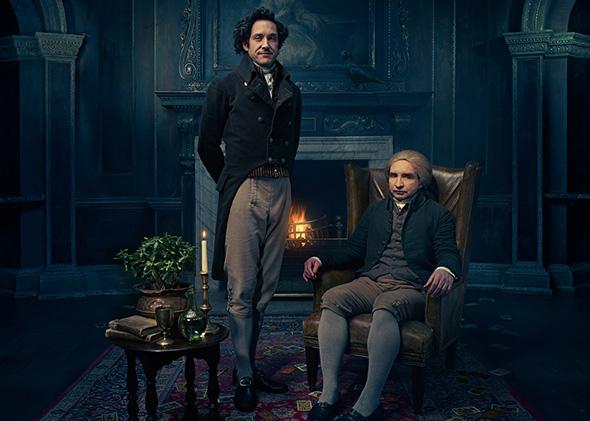Jonathan Strange & Mr. Norrell, which premieres this Sunday on BBC America, is seven hours long and still leaves a lot of stuff out. Its source material, of course, is the 2004 best-seller by Susanna Clarke, in all its 1,006 pages of Napoleonic-fantastical glory, and the first three episodes of this seven-part series are missing all sorts of minor characters and exciting subplots, not to mention all the footnotes.
But even die-hard fans of the book are unlikely to be dissatisfied with these omissions and alterations. After all, though the Dickensian flourishes and the Austenite free indirect narration and the archaic spellings (chuze, shew) and, yes, the 185 footnotes delight and irritate in equal measure while one is actually reading the book, those aspects fade in the memory afterward. What remains is the rivalry at its center, prickly and loving, between the two magicians of the title: chipper Jonathan Strange (Bertie Carvel) and dyspeptic Gilbert Norrell (Eddie Marsan).
Indeed, the series, which was written by Peter Harness and directed by Toby Haynes, in some ways does a better job of bringing that relationship to life than the book does. For starters, it only takes about an hour to get them in the same room, unlike the book, in which they don’t meet for an absurd 285 pages. Mostly, though, it’s that Carvel and especially Marsan give such invigorating performances, and play against each other so beautifully, that they breathe life into a friendship that in the book could feel, at times, a bit schematic.
In the early 19th-century Britain of Jonathan Strange & Mr. Norrell, magic—once at the heart of English society during the reign of the Raven King—has not been performed in 300 years. Into this void steps Norrell, a gentleman of York, who can conjure amazing feats and wishes to see magic returned to its rightful glory all over his nation. (His nation, grim and cold and losing the war in Europe to Napoleon, could use a little razzle-dazzle.) But Norrell’s very limited idea of what magic can and should be is challenged by Strange, a ne’er-do-well who stumbles into a magical career and finds himself better at it than he ever could have expected.
The spark between them comes from Norrell’s warring desires: On the one hand he’s desperate to hoard the magical learning of England for himself; on the other, he yearns to befriend and talk to a peer, someone who can understand what it feels like to fashion a storm from the air or make statues sing. Their first meeting, in the series’ second episode, is a wonderful scene, as a particularly ingenious bit of spellwork from Strange has a correspondingly magical effect on Norrell, transforming him at once from a state of resentful suspicion to one of utter joy at Strange’s cleverness. Marsan’s scowl, trapped for hours under his terrible wig, melts into a beatific smile, and you become instantly convinced of the bond between these two men, no matter what might happen to push them apart.
Though Strange, at least, has a wife (Charlotte Riley) who is put in danger by the pair’s meddling with powerful forces, Jonathan Strange & Mr. Norrell is not at all interested in romance. Its true subject is the love of its two main characters, not for women or even for each other, but for magic itself—which, in Clarke’s presentation, is a dark and perilous force deeply rooted in the earth and spirit of the British Isles. To perform a dangerous spell early in the series, Norrell must summon a faerie (Marc Warren), who capriciously infects the rest of the story, pulling other characters into the underworld with him. I don’t yet get this sense of the true inhuman menace of magic yet from the series, in part because Warren’s costuming and wig are among the series’ few sartorial missteps. He looks less like an ancient, inhuman power and more like Sting if he dressed as a Q-Tip for Halloween.
I’m curious to see whether the series can maintain the narrative momentum it builds up in the first three episodes. I have high hopes for some characters with whom we get only a few scenes in these first episodes, especially Norrell’s servant Childermass, who, as played by the brooding Enzo Cilenti, is so mysterious and brooding that he can childer my mass anytime. (Someone needs to be sexy in this sex-free version of the 1800s.) The show’s effects and production design are remarkably uncheesy thus far, including the scenes of war in Portugal, where Strange goes to help Lord Wellington battle Napoleon. But I worry about the grand spectacles that later episodes will require. The book’s climax is a bit of a storytelling hash; that’s one area where a little TV magic could do real wonders for the book’s odd distaste for excitement. “Can a magician kill a man by magic?” Lord Wellington asks Strange in the third episode. “I suppose a magician might,” Strange replies, “but a gentleman never would.” Thus far Jonathan Strange & Mr. Norrell is quite the gentleman. I hope it gets a little more blood on its hands.
